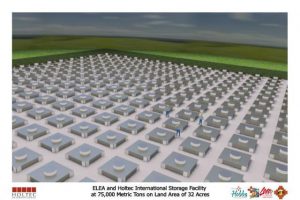
A federal board that oversees commercial nuclear materials and licenses said Tuesday it has rejected a request by a group of opponents over a proposed nuclear waste storage site in Southern New Mexico.
Holtec International, a New Jersey-based company specializing in nuclear reactor technology, is waiting on the U.S. Nuclear Regulatory Commission to approve its license for an expansive facility that could be used to hold all of the nation’s spent nuclear fuel — radioactive uranium left over from power production.
Holtec is partnering with the Eddy Lea Energy Alliance, a coalition of local government officials in Southern New Mexico.
During a three-day hearing earlier this year in Albuquerque, an unlikely alliance of critics, including environmental and anti-nuclear groups as well as a nuclear fuel technology company and an oil and gas producer, raised concerns about the project.
The Sierra Club, Beyond Nuclear Inc., Texas-based Fasken Land and Minerals Ltd. and Georgia-based NAC International Inc. were among those who petitioned the commission to hold a hearing.
The facility is poised to violate federal law and could pose significant public health and safety danger from a radioactive accident, the groups argued. They also were concerned that an accident in Southern New Mexico would threaten the local economy, particularly for ranchers and mineral extraction operations in the region.
An evidentiary hearing would have allowed the groups to challenge Holtec’s licence.
But the commission’s Atomic Safety and Licensing Board said in a 142-page decision that the nearly 50 issues raised by the critics did not meet legal requirements necessary to trigger a hearing.
For instance, the three-member board said, an environmental analysis of the project is required under federal law, but the board does not have to “analyze every conceivable aspect of the project.” Particularly, the board said in its decision, it is not required to assess worst-case scenario events or those that are “remote and highly speculative.”
John Buchser, with the Sierra Club’s Rio Grande Chapter, said the organization intends to appeal the board’s decision to the Nuclear Regulatory Commission.
The proposed facility has been under consideration for several years and was supported by former Gov. Susana Martinez as well as many officials in the region, which also is home to the Waste Isolation Pilot Plant.
So far, WIPP, an underground storage site, is the only place to permanently deposit lower-level nuclear waste created by the Department of Energy’s weapons production efforts.
Holtec filed an application in 2017 to design a facility that would place removable canisters in a “dry-cask” storage system 25 feet below ground — where, the company argues, they would be more secure than if they remain at various nuclear power plants around the county.
The casks could be transferred to a permanent storage location in the future — though no such facility exists, and plans to open a site in Nevada were stalled by political and social pushback in that state in recent years.
A temporary storage site also has been proposed in West Texas, just across the border.
Groups critical of the plan said the license Holtec has requested — initially for 40 years, with the potential to operate for more than a century — contradicts federal law. The Department of Energy cannot legally take ownership of waste from private nuclear power stations unless a permanent repository is in operation. There are also questions about whether federal law allows storage of any high-level nuclear waste at a temporary facility when the nation has no designated site for permanent storage.
“Until the law changes on those two points, they can’t transport the waste,” Buchser said, adding New Mexicans statewide should be concerned about the project.
Critics also question whether private companies will be willing to take on the high cost and liability of shipping spent fuel to New Mexico.
Among other concerns raised by the petitioners: the safety of transportation by railroad on aging lines, the possibility of leaking canisters, the risk of water and environmental contamination, and the threat to oil and gas development in the booming Permian Basin.
The Nuclear Regulatory Commission’s Atomic Safety and Licensing Board said, however, it assumes Holtec and the Department of Energy “would not be complicit in any such unlawful contracts.”
Holtec and the board also said Congress could amend the Nuclear Waste Act to allow the Department of Energy to take ownership of the spent fuel, even without a permanent storage facility on the horizon.
The ruling put the project on track to be licensed by 2020, the company said.
Buchser, with the Sierra Club, said the onus now lies with New Mexico’s congressional delegation, governor and attorney general to decide if they support the project and the implications of an expanded nuclear waste footprint in New Mexico.
“The whole concept of consent for our politicians here in New Mexico becomes extremely important,” he said.
